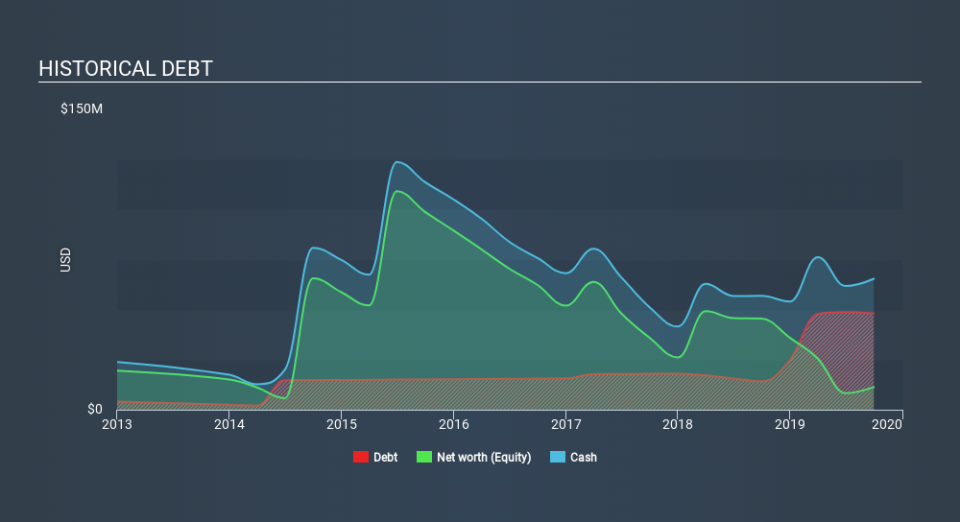Is Ocular Therapeutix (NASDAQ:OCUL) Using Debt In A Risky Way?

David Iben put it well when he said, 'Volatility is not a risk we care about. What we care about is avoiding the permanent loss of capital. So it might be obvious that you need to consider debt, when you think about how risky any given stock is, because too much debt can sink a company. As with many other companies Ocular Therapeutix, Inc. (NASDAQ:OCUL) makes use of debt. But the real question is whether this debt is making the company risky.
When Is Debt A Problem?
Debt and other liabilities become risky for a business when it cannot easily fulfill those obligations, either with free cash flow or by raising capital at an attractive price. Part and parcel of capitalism is the process of 'creative destruction' where failed businesses are mercilessly liquidated by their bankers. However, a more common (but still painful) scenario is that it has to raise new equity capital at a low price, thus permanently diluting shareholders. Of course, plenty of companies use debt to fund growth, without any negative consequences. The first step when considering a company's debt levels is to consider its cash and debt together.
See our latest analysis for Ocular Therapeutix
How Much Debt Does Ocular Therapeutix Carry?
You can click the graphic below for the historical numbers, but it shows that as of September 2019 Ocular Therapeutix had US$48.1m of debt, an increase on US$14.2m, over one year. However, its balance sheet shows it holds US$65.4m in cash, so it actually has US$17.3m net cash.
A Look At Ocular Therapeutix's Liabilities
According to the last reported balance sheet, Ocular Therapeutix had liabilities of US$11.0m due within 12 months, and liabilities of US$66.4m due beyond 12 months. On the other hand, it had cash of US$65.4m and US$1.11m worth of receivables due within a year. So its liabilities total US$10.9m more than the combination of its cash and short-term receivables.
Given Ocular Therapeutix has a market capitalization of US$192.3m, it's hard to believe these liabilities pose much threat. Having said that, it's clear that we should continue to monitor its balance sheet, lest it change for the worse. While it does have liabilities worth noting, Ocular Therapeutix also has more cash than debt, so we're pretty confident it can manage its debt safely. There's no doubt that we learn most about debt from the balance sheet. But ultimately the future profitability of the business will decide if Ocular Therapeutix can strengthen its balance sheet over time. So if you want to see what the professionals think, you might find this free report on analyst profit forecasts to be interesting.
In the last year Ocular Therapeutix wasn't profitable at an EBIT level, but managed to grow its revenue by25%, to US$2.5m. Shareholders probably have their fingers crossed that it can grow its way to profits.
So How Risky Is Ocular Therapeutix?
By their very nature companies that are losing money are more risky than those with a long history of profitability. And in the last year Ocular Therapeutix had negative earnings before interest and tax (EBIT), truth be told. And over the same period it saw negative free cash outflow of US$74m and booked a US$78m accounting loss. Given it only has net cash of US$17.3m, the company may need to raise more capital if it doesn't reach break-even soon. Ocular Therapeutix's revenue growth shone bright over the last year, so it may well be in a position to turn a profit in due course. Pre-profit companies are often risky, but they can also offer great rewards. When I consider a company to be a bit risky, I think it is responsible to check out whether insiders have been reporting any share sales. Luckily, you can click here ito see our graphic depicting Ocular Therapeutix insider transactions.
If you're interested in investing in businesses that can grow profits without the burden of debt, then check out this free list of growing businesses that have net cash on the balance sheet.
If you spot an error that warrants correction, please contact the editor at editorial-team@simplywallst.com. This article by Simply Wall St is general in nature. It does not constitute a recommendation to buy or sell any stock, and does not take account of your objectives, or your financial situation. Simply Wall St has no position in the stocks mentioned.
We aim to bring you long-term focused research analysis driven by fundamental data. Note that our analysis may not factor in the latest price-sensitive company announcements or qualitative material. Thank you for reading.


